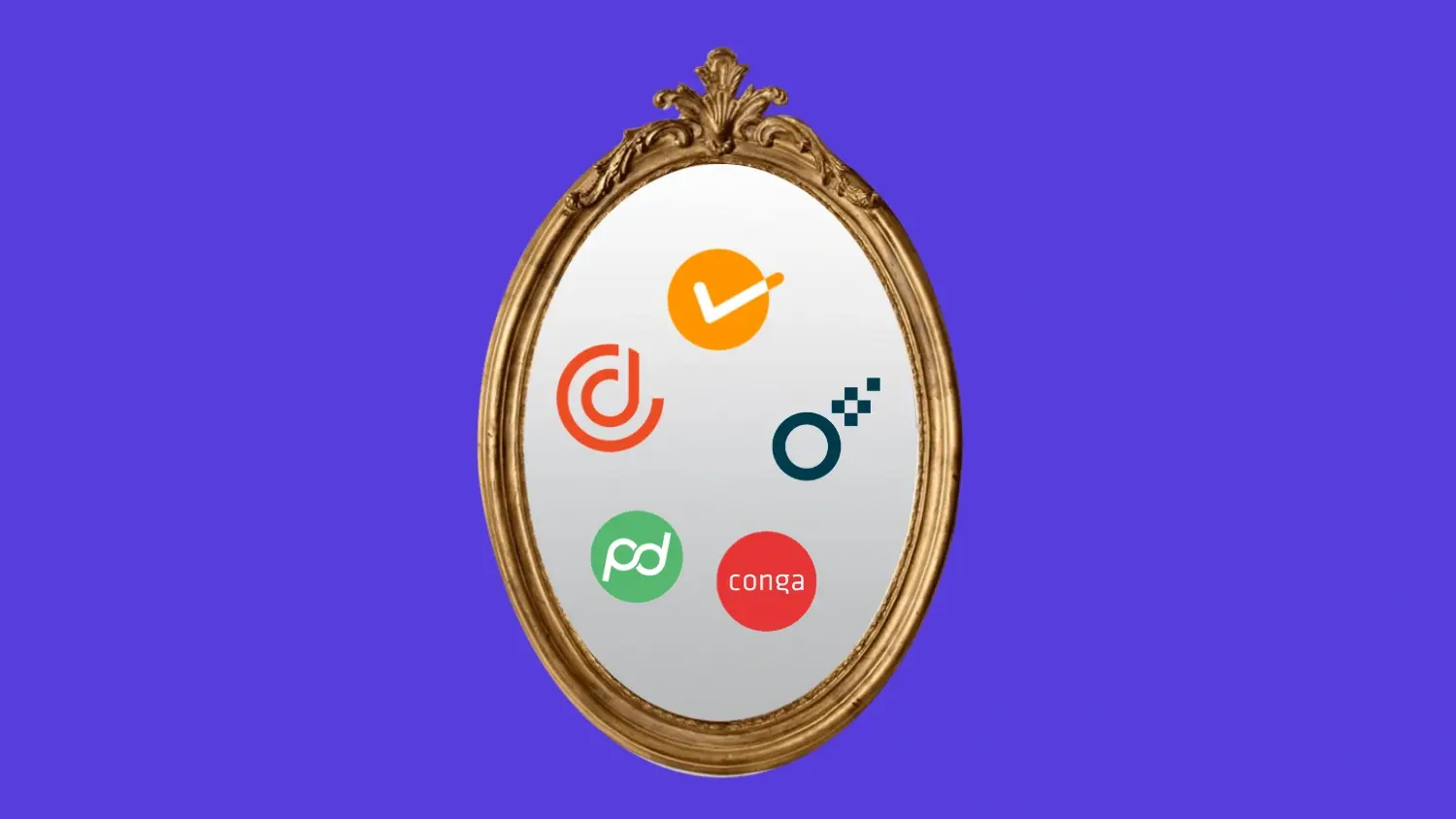Enterprise sales is high-stakes, high-complexity, and deeply collaborative.
The right proposal software can make the difference between losing a key deal and hitting quota.
In this hands-on guide, we tested and compared the best proposal software for enterprise sales teams in 2026 - based on real platform usage, not just feature lists.
Whether you're managing long sales cycles, managing cross-functional teams, or standardizing processes at scale, this review breaks down what each tool actually delivers.
We looked at how each solution supports:
-
CRM integration with platforms like Salesforce and Dynamics
-
Global content management and version control
-
Visibility into buyer engagement across stakeholders
-
Standardized templates and automated approvals
-
Complex deal workflows, renewals, and compliance
Let’s dive in.
What is enterprise proposal software?
Enterprise proposal software helps large B2B sales organizations create, manage, track, and close complex deals at scale. Unlike basic proposal tools for small teams, enterprise solutions are built to handle high-stakes requirements.
- Standardized workflows and approval processes
- Deep CRM integrations for a single source of truth
- Advanced security, compliance, and governance features (SOC 2, eIDAS, SSO)
The best platforms go beyond document creation. They centralize sales content, provide real-time visibility into buyer engagement, and automate workflows from quote to final e-signature.
How we evaluated enterprise proposal software
We focused on what matters most to enterprise sales orgs: scalability, governance, and integration. Rather than just compare surface-level features, we tested each platform on real enterprise needs.
We also looked at setup complexity, support responsiveness, and flexibility. This isn't a "best-for-everyone" list; it's a deep dive into which software meets enterprise-grade requirements.
Enterprise proposal software comparison: Top 5 platforms at a glance
| Platform | CRM Integration | CPQ | Contract Mgmt | Buyer Engagement | Price |
|---|---|---|---|---|---|
| GetAccept | ✅ Native (Salesforce, Dynamics, HubSpot, Pipedrive) | ✅ Built-in | ✅ Full CLM | ⭐⭐⭐⭐⭐ Live chat, video, analytics, DSR | From $49/mo, enterprise plans available |
| PandaDoc | ✅ Native (Salesforce, HubSpot) | ✅ (Enterprise plan) | ✅ Strong, template-driven | ⭐⭐ Basic analytics, no real-time chat | From $35/mo |
| DealHub | ✅ Native (Salesforce, HubSpot, Dynamics) | ✅ Advanced logic & bundling | ✅ With approval workflows | ⭐⭐ DSR-lite, limited interactivity | Custom pricing |
| Conga | ✅ Deep Salesforce-native | ✅ Industry-leading | ✅ Full CLM & redlining | ⭐ Basic tracking, no DSR features | Custom pricing |
| Oneflow | ✅ Salesforce, Dynamics | ❌ No CPQ | ✅ Dynamic HTML docs & workflows | ⭐⭐ Post-send editing, no real-time chat | Free (limited), paid plans available |
As you can see, while all five platforms offer core enterprise capabilities, they differ significantly in how they support CRM-native workflows, CPQ sophistication, and buyer engagement. Use this table to shortlist tools that match your enterprise team's top priorities - whether that’s speed, control, or collaboration.
The best proposal software platforms for enterprise sales teams in 2026
1. GetAccept: Best for enterprise teams prioritizing buyer engagement and CRM integration
GetAccept is a Digital Sales Room platform purpose-built for enterprise sales organizations. It brings structure, visibility, and speed to even the most complex sales cycles.
Enterprise orgs face challenges such as fragmented processes and limited visibility. GetAccept solves this by centralizing every interaction in a secure, trackable workspace that syncs with your CRM.
Enterprise-ready highlights:
-
Native CRM integrations (Salesforce, Dynamics, HubSpot, Pipedrive): Auto-fill documents with CRM data, track engagement in real-time, and update deal stages automatically - all without leaving your CRM.
-
Governance and standardization: Use pre-approved templates, mandatory fields, and approval workflows to ensure brand consistency, legal compliance, and faster onboarding for new reps.
-
Content control & personalization: Centralize sales assets in one place, and empower reps to customize proposals with dynamic content blocks, embedded video, and smart variables - without version chaos.
-
Buyer engagement & visibility: Know exactly who’s engaging with your proposal, when, and for how long. Live chat, notifications, and comment threads keep conversations moving forward.
-
Global e-signatures & compliance: Close deals confidently with legally binding e-signatures that meet eIDAS, ESIGN, and UETA standards - all fully mobile-friendly and secure.
Cons:
-
Teams that don't use Salesforce, HubSpot, Dynamics, or Pipedrive get less value from integrations.
-
May require process changes for teams deeply embedded in legacy workflows.
Best for: Enterprise teams that sell complex B2B solutions with multiple stakeholders and need complete visibility into buyer engagement while maintaining CRM data integrity.
Pricing: Professional plan starts at $49/month per user, with enterprise plans available.
2. PandaDoc: Best for enterprises needing document workflow automation
PandaDoc is a versatile document automation platform offering end-to-end workflows. It's designed for enterprises looking to digitize high volumes of document-based processes.
PandaDoc supports organizations with large sales forces and cross-functional stakeholders. It's effective for teams focused on operational efficiency and template-driven processes at scale.

Enterprise-ready highlights:
-
Customizable templates and content library: Create reusable templates and lock specific content blocks to standardize branding, legal language, and pricing across global teams.
-
CPQ capabilities (Enterprise plan): Quote products from a catalog with configurable pricing and embedded logic. Ideal for companies needing tight control over pricing consistency.
-
Robust e-signature functionality: Secure, legally binding signatures that meet ESIGN and UETA standards - with encryption, audit trails, and mobile-friendly delivery.
-
Workflow automation: Trigger internal approval flows, auto-assign tasks, and sync documents with your CRM, HR, or finance tools via native integrations or API.
-
Reporting and analytics: Get visibility into send, open, and view times - though more basic than platforms built specifically for sales collaboration.
Cons:
-
Limited real-time collaboration features compared to Digital Sales Room platforms.
-
Analytics focus on document activity rather than buyer intelligence.
-
CPQ features are only available on the Enterprise plan.
Best for: Enterprise organizations looking to digitize document workflows across multiple departments with an emphasis on operational efficiency over sales collaboration.
Pricing: Business plans start at $49/month per user, and enterprise plans offer advanced features such as CPQ and workflow automation.
3. DealHub: Best for enterprises prioritizing CPQ and revenue operations
DealHub is a revenue workflow platform for large sales organizations with complex quoting and pricing. Its strength lies in its CPQ-first architecture and robust contract management.
It's powerful for companies managing complex pricing models and multi-tier approvals. DealHub helps centralize revenue workflows across quoting, proposals, and contracts.

Enterprise-ready highlights:
-
Advanced CPQ functionality: DealHub’s native CPQ engine supports conditional logic, dynamic product bundles, discount approvals, and guided selling - crucial for enterprise sales teams handling technical or configurable products.
-
Contract lifecycle management: Includes versioning, role-based access, negotiation tracking, and AI-powered tagging - supporting teams managing multiple stakeholders and long deal cycles.
-
Embedded Digital Sales Room experience: While not a full DSR platform, DealHub provides a personalized buyer-facing workspace to share documents, pricing, and timelines - improving transparency and buyer collaboration.
-
CRM-native workflows: Deep integrations with Salesforce, HubSpot, and Microsoft Dynamics allow reps to generate proposals and quotes directly inside their CRM, reducing tool-switching and admin time.
-
Audit trails and compliance controls: Enterprise IT and procurement teams will appreciate DealHub’s governance features, including approval workflows, compliance documentation, and activity logs.
Cons:
-
The eSignature tool is functional but less advanced - some teams opt to integrate with DocuSign or Adobe Sign for enhanced flexibility
-
Limited interactive or real-time collaboration tools for engaging buyers throughout the deal (vs. purpose-built DSRs like GetAccept)
-
No native post-signature workflows for onboarding or renewals - requiring additional tools
Best for: Enterprise sales organizations with complex product catalogs, configurable pricing, and dedicated RevOps teams managing quote-to-cash workflows.
Pricing: No pricing is available on their website.
4. Conga: Best for enterprises with complex compliance and Salesforce-native needs
Conga is a mature, enterprise-grade platform built to automate the full quote-to-cash lifecycle. It's best for large organizations with structured processes and deep reliance on Salesforce.
Conga is built for scale. Its modular platform supports everything from document generation to CPQ and contract lifecycle management (CLM).

Enterprise-ready highlights:
-
Advanced CPQ capabilities: Conga handles advanced configuration rules, custom pricing models, approvals, and renewals. Ideal for companies managing bundled or usage-based pricing, with tight CRM syncing.
-
End-to-end contract lifecycle management: Enterprises can create, track, negotiate, approve, and store contracts - all while maintaining audit trails, redlining history, and renewal alerts.
-
Deep Salesforce integration: Conga’s solutions are native to Salesforce, enabling teams to generate quotes, send documents, and trigger contract workflows without leaving their CRM.
-
Regulatory and compliance strength: With features like clause libraries, version control, and granular access permissions, Conga supports legal and procurement teams that require rigorous oversight and consistency.
Cons:
-
Limited buyer engagement tools - no native live chat, video, or deal room functionality.
-
Implementation and customization can be time- and resource-intensive.
Often requires dedicated admins or consultants to maintain over time.
Best for: Large enterprises in regulated industries (pharma, finance, manufacturing) that need sophisticated CPQ and CLM capabilities with deep Salesforce integration.
Pricing: No pricing is available on their website.
5. Oneflow: Best for enterprises focused on contract flexibility and post-send editing
Oneflow is a contract lifecycle management (CLM) platform for sales, HR, and procurement teams. It helps manage high volumes of contracts with clarity and control.
Enterprises use Oneflow to centralize contract creation, collaboration, and archiving. Its HTML-based format enables real-time editing, helping teams stay agile during negotiations.

Enterprise-ready highlights:
-
HTML-based smart documents: Oneflow documents are fully editable after sending, eliminating back-and-forth emails when changes arise. This dynamic format is a huge plus in longer enterprise deal cycles where flexibility is critical.
-
Signing roles and sequences: Set up multi-step workflows with distinct signer, viewer, and influencer roles - essential when navigating enterprise-level approval chains.
-
Salesforce and Microsoft Dynamics integrations: Oneflow supports native integrations with leading CRMs, allowing sales reps to send, track, and archive contracts directly from their workflow.
-
Contract visibility and organization: All documents are searchable and filterable, making it easier for large teams to locate contracts, monitor expiration dates, and manage renewals at scale.
Cons:
-
Limited interactive features like buyer chat, embedded video, or personalized walkthroughs.
-
Engagement tracking is basic - it doesn’t provide deep insights into buyer behavior or intent.
-
More focused on contract execution than proposal creation or deal acceleration.
Best for: Fast-growing enterprises and multinational organizations that prioritize contract flexibility and real-time editing during negotiations.
Pricing: Business plans start at $45/month per user, with enterprise plans available.
How to choose the best enterprise proposal software: 7 key criteria
Choosing the right proposal software isn't about ticking feature boxes. It's about finding a platform that supports your entire sales operation at scale.
For enterprise teams, the stakes are higher, and processes are more complex. Here's what to prioritize:
1. Scalability across teams and territories
Enterprise sales involves multiple business units, product lines, and geographies. Look for a platform that supports global rollouts and enforces standardized workflows.
2. CRM integration that actually works
A surface-level integration isn't enough. Your proposal software should deeply embed into your CRM to auto-fill data, track interactions, and sync updates in real time.
3. Security and compliance
Handling sensitive data comes with risk. Choose a provider that meets international standards and offers granular access control.
-
Key certifications: Look for SOC 2 Type II, GDPR, eIDAS, and ESIGN compliance.
-
Access control: Ensure the platform has role-based permissions and detailed audit trails.
4. Customization and control
Enterprise deals are rarely one-size-fits-all. Your platform should allow flexible workflows, including multi-stage approvals and modular templates, without requiring developer support.
5. Buyer engagement and visibility
Modern B2B buyers expect more than a PDF. Look for platforms with interactive features like video and live chat, as well as real-time analytics to understand buyer behavior.
6. Analytics and reporting depth
Enterprise sales leaders need more than "proposal opened" notifications. Look for platforms that provide stakeholder-level engagement tracking and content performance analytics.
The best platforms make this data actionable. They can alert you when a buying committee's engagement spikes or when a deal has gone cold.
7. Template management and content library
Consistency at scale requires robust content management. Your software should include a centralized content library with version control and approval workflows.
This ensures every proposal is on-brand, compliant, and built from your best-performing content.
Choosing the right proposal software for your enterprise team
For enterprise sales teams, proposal software is essential infrastructure. The right platform helps standardize processes, reduce errors, and give leadership full visibility into buyer engagement.
Each of the five platforms we reviewed has strengths. But if you're looking for seamless CRM integration, true buyer engagement, and centralized content management, there's one clear choice.
GetAccept brings it all together. That's why more enterprise sales teams are making the switch to win faster, collaborate better, and close with confidence.
How GetAccept’s proposal software impacts enterprise sales performance
The right proposal platform doesn't just make your team more efficient; it fundamentally changes your sales outcomes.
Faster proposal creation and sales cycles
We helped Satchel streamline their proposal process by making it more consistent, faster, and easier to track.
Since using GetAccept’s proposal software, they have a more consolidated, well-integrated tech stack that allows Salesforce to remain their single source of truth.
Thanks to GetAccept, they also have better control over the proposal documents their reps are sending out, proposal creation is up to 70% quicker, and it’s easy to keep track of key data and metrics relating to their deals. In concrete terms, their team saves 14 hours per month previously spent on creating proposals.
Higher close rate
ScaleWise needed a way to create proposals professionally, present all content in one branded hub, and manage contracts without slowing the process. Before GetAccept, proposals were a manual puzzle of PDFs, decks, and terms. Gavin recalls how each document had to be assembled and formatted after every call.
By creating a master template and a library of assets in GetAccept, ScaleWise can assemble branded proposals in minutes. The result? 51% increase in proposal-to-close rate (17 points) on top of the ~55 minutes they save every time they create a proposal.
Ready to try?
If you are curious about how you could use GetAccept to create, send, and sign proposals quickly and securely, you have two options:
-
Book a demo with us! We'll show you the parts of the platform that are most relevant to you
-
Start a free trial. Give the product a go for yourself and explore in your own time (no credit card required)




